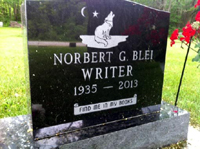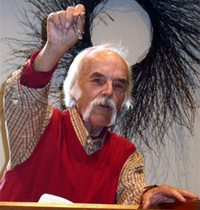
Madame de Pompadour – “au reste, après nous, le Déluge“ (“After us, the Deluge”)
NOTES from the UNDERGROUND # 194 | August 7, 2009
COLLAPSE
WHAT WE LEAVE BEHIND
by Derrick Jensen and Aric McBay
Seven Story Press, 2009
This book is full of shit.
So am I, so are you, so is the culture, the world, the planet. We’re all in it up to here.
It’s garbage.
It’s all waste.
This book is over 400 pages long, costs $25, and worth every penny—if you really give a shit about how you live and what you leave behind.
Buy a copy for yourself, your children, your grandchildren. If you can’t afford it (the price of a large pizza and a small beer), make sure your public library orders it.. No library in the country should be without a copy.
This is not your usual well written, interesting, informative, occasionally beautifully illustrated book about the environment causing you to hum along, yawn, sip your bottled water, nod gently to yourself in agreement: Yes, the world is sure going to hell… something should be done about it…but I need to buy more plastic shit for the house, more hair-spray, more sports shit, more toy shit, more technical shit, more chemical shit to keep the lawn green…more and more, shit….)
There’s a lot of good shit in this book.
This book is divided into three parts, covering such topics as Decay, Waste, Garbage, Sustainability, Plastic, Medicine, Toxic Gifts, Bodies, Morality, Legacy, The Real World, Despair, Growing Up, Technotopia, Fighting Back, The Living…
There are plenty of engaging quotations scattered throughout, usually introducing each new topic. Try some of these on for size:
“I have always looked upon decay as being just as wonderful and rich an expression of life as growth.” —Henry Miller
“To desire immortality is to desire the eternal perpetuation of a great mistake.” —Schopenauer (Preceding an essay on “PLASTIC”)
“Some of us have become used to thinking that woman is the nigger of the world, that a person of color is the nigger of the world, that a poor person is the nigger of the world…But, in truth, Earth itself has become the nigger of the world.” —Alice Walker
“At this moment in history, we are all caught in the hell of passivity.” –R.D.Lang
“EMBALM, v.i. To cheat vegetation by locking up the gases upon which it feeds By embalming their dead and thereby deranging the natural balance between animal and vegetable life, the Egyptians made their once fertile and populous country barren and incapable of supporting more than a meagre crew. The modern metallic burial casket is a step in the same direction, and many a dead man who ought now to be ornamenting his neighbors lawn as a tree, or enriching his table as a bunch of radishes, is doomed to a long inutility. We shall get him after a while if we are spared, but in the meantime the violet and rose are languishing for a nibble at his glutoeus maximus.”. –Ambrose Bierce
“Life begins on the other side of despair.” –Jean-Paul Sartre
I neglected to mention that this is a beautifully written book. The prose sweeps you up. There are pages and pages that read like poetry. You can open the book anywhere and be instantly, totally captivated by the ideas, the sound of words– part street talk, science, philosophy, literature, down-home real.
It’s extraordinary. It borders on biblical.
I don’t know where to begin, there’s so much to show and tell about.
So how about this excerpt? Then go get your own copy. –Norbert Blei
![]()
Industrial civilization is incompatible with life. It is systematically destroying life on this planet, undercutting its very basis. This culture is, to put it bluntly, murdering the earth. Unless it’s stopped—whether we intentionally stop it or the natural world does, through ecological collapse or other means—it will kill every living being. We need to stop it.
BODIES
The MOST INTIMATE, FUNDAMENTAL GIFT we can and must and do give each other is our bodies. Our bodies are the most ancient, most vital of all gifts.
This gift is far older than language, far older and deeper than words. It is as old as life itself, if not older. It is older than birth, perhaps older than death, as old as metaphor, possibly even as old as dreams.
This giving, and taking, of bodies, of flesh on flesh, flesh on stone, stone on root, root in stone, stomach on stone, skin, soil, is within and before all life, if there is a before all life. It is older than sex, older than that joining and unjoining then joining to become a third: different, new. It is older than this creativity. It is older than the bee, the pollen, the nectar, the pistil. It is older in this way than the wind. It is older than trees, older than ferns, older than algae. It is older than animals, older than mushrooms, older even than mycelia.
This gift is old. Old, like waves falling onto rocks, and rocks falling into waves. It is as old as mud, old as clouds, or even older. It is old, like water, like air, like everything.
Bodies shared, through sex, through touching, through breathing, through absorbing, eating, being eaten, becoming one or becoming another: all this is the gift of life, in all physical truth.
Bodies sustain us. They are us. They support us. We consume them. They become us, are us, as we become them, now, and later.
This gift, this support, this becoming, is where we come from, and where, whether we wish or not, we go.
![]()
There is no waste in nature. One person’s shit is another person’s food, And one person’s body is another person’s food. We give, and we take, and we give. This is how life has always been. This is life.
![]()
Reciprocity is the key to survival. Reciprocity is the essence of life. It is life, It is what we do. It is what we all do.
We are told, more or less incessantly, that survival is based on being the meanest, strongest, most selfish, best able to exploit.
But those who say that are wrong. They have forgotten—or do not care to remember—that nature loves a community. This is true on every scale, from the largest to the most personal. It’s simply true that nature loves a community more than nature loves you or me. Nature loves a community more than nature loves a community-destroying culture. Nature loves a community more than nature loves industrial civilization.
I’m sorry to report that it is not true that all of evolution has taken place to bring you or me into being. It is not true that all of evolution has taken place so that humans will exist. It is not true that all of evolution has taken place so that for a short time a relatively few (fiscally) rich humans can look at computers, watch televisions, and buy (and throw away) cell phones. It is not true that all of evolution has taken place so that humans can create industrial civilization. It is not true that all of evolution has taken place so that industrial civilization can deform humans to fit the needs of industrial civilization. It is not true that all of evolution has taken place so that humans can destroy life on this planet in the service of industrial civilization.
I’m sorry to have to be the one to deliver that news.
This culture is extraordinary, but not so much for the reasons so many people like to pretend: its high technology; its gadgets; its relentless expansion; its vast military capabilities; its art, literature, music, science, philosophy (such as it is). Instead, it is extraordinary in that it does not give back to the land, the water, the air, the nonhumans, the vast majority of humans.
This culture is even more extraordinary in that many of its members seem to think they can continue to not give back, and survive.
Or maybe they can survive, all the while keeping their jetskis and RVs, their gold and brass rings, their interstate highways and disposable diapers, their aircraft carriers and superdomes. They can keep this culture until they die.
Personally.
Only if they are already very old.
The planet is collapsing. Now. This culture is causing this collapse.
I’ll say it again, since not enough people seem to be listening: this culture is killing the planet.
This culture is killing the planet.
Don’t listen to me. Listen to the planet.
But a refusal to listen is part of the problem. We’re taught (some explicitly, all implicitly) to become masterful at refusing to listen, and then to become just as masterful at refusing to acknowledge—to others, but most especially to ourselves—that not only are we not listening but that there is even anything to hear in the first place.
Many members of this culture—evidently an overwhelming majority, given the relatively small number of people actually doing anything to stop the destruction—simply don’t care. Many of them were taught (once again, some explicitly, all implicitly) that if they ignore (in fact, foreclose) all possibility of relationship, and if they don’t mind harming those around them (in fact making life impossible for many of those around them, and if they don’t mind pretending not to notice the harm they cause and then pretending they’re not pretending not to notice, and then pretending they’re not pretending they’re not pretending not to notice, and so on ad omnicdium), and if it doesn’t bother them that they’re destroying the land and air and water that those who come after them will need to survive, then they can take advantage of the short-term competitive advantage that not giving back gives them, and thus they can more effectively dominate, enslave, exploit, or simply kill all those who do give back (and who therefore must be inferior), and who have the misfortune to come into contact with them. Then when they reach to every part of the earth—meaning that more or less everyone has the misfortune of coming into contact with them—as this narcissistic nonreciprocal culture now does, they will kill the planet that (or rather, who) supports them. But many of these individual narcissists will die before then. And so they can say, and mean, that statement most famously said by King Louis XV’s mistress Madame de Pompadour: when the king’s ministers complained that her extravagance (and the extraordinarily expensive wars her advice helped cause) was going to lead to their own destruction, she laughed them off with the phrase, “Apres nous le deluge,” literally translated as, “After us, the deluge,” more loosely translated as, “When we are dead the deluge may come for aught I care.”199 And she was right. She died in 1764, some fifteen years before the deluge of the French Revolution and nineteen years before the Reign of Terror, with its deluge of blood—both royal and otherwise—flowing from the guillotine.
![]()
Apres nous le deluge.
I guarantee this statement will be far more accurate and deadly for those who say it now than for those who said it before. This time, as the entire world collapses, it is not just the French but everyone who pays. Everyone.





























































Leave a comment